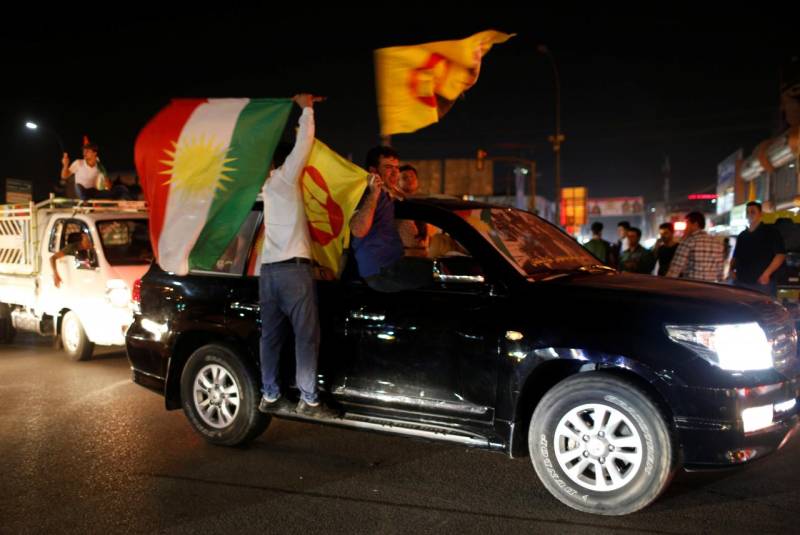Baghdad (Reuters): The Iraqi government ruled out talks on possible secession for Kurdish-held parts of northern Iraq on Tuesday after a referendum on independence showed strong support for a split.
Initial results of Monday’s vote indicated 72 percent of eligible voters had taken part and an overwhelming majority, possibly over 90 percent, had said “yes”, Erbil based Rudaw TV said. Final results are expected by Wednesday.
Celebrations continued until the early hours of Tuesday in Erbil, capital of the Kurdish region, which was lit by fireworks and adorned with Kurdish red-white-green flags. People danced in the squares as convoys of cars drove around honking their horns.
In ethnically-mixed Kirkuk, local Kurdish-led authorities lifted an overnight night curfew imposed in city, where Arabs and Turkmen opposed the vote. The referendum has fueled fears of a new regional conflict.
Kurdistan Regional Government (KRG) President Masoud Barzani says the vote is not binding, but meant to provide a mandate for negotiations with Baghdad and neighboring countries over the peaceful secession of the region from Iraq.
Baghdad persisted in its unwavering opposition to Kurdish independence. “We are not ready to discuss or have a dialogue about the results of the referendum because it is unconstitutional,” Iraqi Prime Minister Haider al-Abadi said in a speech on Monday night.
The Kurds held the vote despite threats from Baghdad and Iraq’s powerful neighbors, Iran and Turkey, to block it.
Iraqi Kurds - part of the largest ethnic group left stateless when the Ottoman empire collapsed a century ago - say the referendum acknowledges their contribution in confronting Islamic State after it overwhelmed the Iraqi army in 2014 and seized control of a third of Iraq.
Voters were asked to say ‘yes’ or ‘no’ to the question: “Do you want the Kurdistan Region and Kurdistani areas outside the (Kurdistan) Region to become an independent country?”
With 30 million ethnic Kurds scattered across the region, mainly in Iraq, Iran, Turkey and Syria, governments fear the spread of separatism to their own Kurdish populations.
President Tayyip Erdogan has said Turkey could cut off the pipeline that carries oil from northern Iraq to the outside world, and Iraq said its army had started “major manoeuvres” with the Turkish army at the border.
Turkey later took the Rudaw TV channel off its satellite service TurkSat, a Turkish broadcasting official told Reuters.
The US State Department said it was “deeply disappointed” by the KRG’s decision to conduct the referendum but added that Washington’s “historic relationship” with the people of the Iraqi Kurdistan Region would not change.
Asked about the referendum, White House spokeswoman Sarah Sanders said on Monday: “We hope for a unified Iraq to annihilate ISIS (Islamic State) and certainly a unified Iraq to push back on Iran.”


